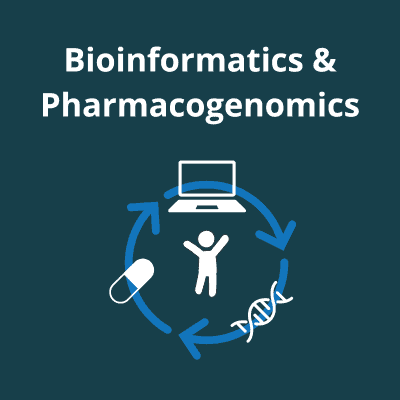Pharmacogenomics and Bioinformatics
- 3rd September 2024
- Posted by: Breige McBride
- Category: Bioinformatics

Bioinformatics plays a vital role in pharmacogenomics research as it facilitates the analysis of complex genetic data. Such analyses reveal insights which allow patients to be prescribed the most effective drugs for them as an individual. This blog demonstrates how pharmacogenomics and bioinformatics work together to advance personalised healthcare and improve patient outcomes.
What is pharmacogenomics?
Pharmacogenomics is the study of how genetic variation influences an individual’s response to drugs. While traditional medicine often follows a one-size-fits-all approach, pharmacogenomics considers each person’s genetic profile to determine the most effective and safest medications. Advances in genomic technologies and a growing understanding of the human genome have been fuelling progress in the field, which has evolved rapidly over the last two decades. The overall goal of pharmacogenomics is to improve patient outcomes by tailoring drug therapies to an individual’s genetic makeup. Thereby reducing the trial-and-error process of prescribing medications.
How does genetic variation influence drug response?
Genetic differences can significantly impact how individuals respond to drugs. While one person may have a positive outcome, a genetic variation in another person could mean the same drug is ineffective for them. In fact the same drug may have a positive outcome in one person but have a negative outcome for another. Genetic variations in the population can affect how individuals metabolise drugs, the side effects they experience and the overall effectiveness of the drug for treating their condition.
Some genetic differences can cause drugs to break down at different rates, affecting their potency and duration of action. For example, people with specific variants in the CYP2D6 gene might metabolise some antidepressants and pain medications faster or slower than the drug was intended to be processed1. If their body processes the drug at a different speed than intended, the drug may be less effective or they may have an increased risk of experiencing side effects. However, understanding people’s genetic variants and how this can affect how they metabolise drugs, enables more precise drug dosing and selection, potentially leading to better treatment outcomes.
What is the role of bioinformatics in pharmacogenomics?
Identifying which genetic variants are relevant to specific drugs involves analysing vast amounts of data. Then, once relevant variants are identified, their clinical relevance needs to be determined. This can be particularly challenging as interpreting clinical significance isn’t a simple process, due to the interplay of multiple genes and environmental factors. However, bioinformatics plays a key role in resolving these issues. Since bioinformatics tools and algorithms are designed to analyse huge datasets, they can analyse the enormous datasets that pharmacogenomics research generates. Also, bioinformatics techniques help determine the clinical relevance of genetic variants. For example, predictive modeling enables researchers to simulate how different genetic profiles will respond to a drug.
Another key role of bioinformatics in pharmacogenomics is facilitating the integration of omics data to provide a deeper understanding of drug mechanisms. For example, bioinformatics has already played an instrumental role in developing personalised cancer therapies, as it has been used to integrate and analyse genetic data from tumours in order to select the most effective treatment.
Advancing pharmacogenomics research with bioinformatics
If you would like to learn more about how bioinformatics can support your particular pharmacogenomics research, Fios Genomics can help. We have been providing bioinformatics services for 16 years and have worked on many and varied pharmacogenomics research projects. Some ways we can help include:
- WGS/WES sequence alignment, mapping and analysis
- Genome-Wide Association Studies (GWAS)
- Variant annotation and functional prediction
- Mendelian randomisation analysis
- Pathway and network analysis
You can learn more about these and our other services related to genetic variation on our Genetic Variation Analysis service page. We can also mine public databases to gather and interpret existing knowledge about gene-drug interactions and allele frequencies to support pharmacogenomics research. Learn more about our data mining capabilities on our Data Landscaping and Mining service page.
We have also contributed to published research demonstrating how early understanding of pharmacology and genomics can improve strategies for the development of precision medicines:
If you would like our support with a pharmacogenomics project, or have a question about the services we provide, you can use the form below to get in touch. We are always happy to advise on the most suitable bioinformatics analyses to answer specific pharmacogenomics research questions.
Author: Breige McBride, Marketing Manager, Fios Genomics
Reviewed by Fios Genomics Bioinformatics Experts to ensure accuracy
1 https://www.nature.com/articles/s41398-020-01020-z
See Also:
Optimising IND applications with bioinformatics

